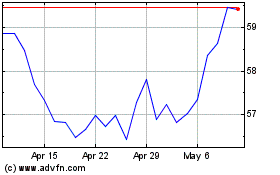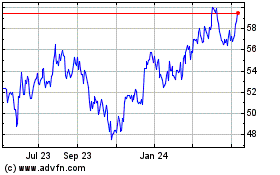Switching Type of Dietary Fat Americans Consume Could Decrease Healthcare Costs by More Than $25 Billion Annually
October 10 2016 - 8:00AM
Business Wire
New study shows decreased risk of heart disease
from replacing saturated fats with monounsaturated fats nets
significant healthcare savings
A new study finds substituting monounsaturated fats (MUFAs) for
saturated fats in the diet could save the U.S. $25.7 billion in
heart-disease related healthcare costs annually. The results,
recently published by the Journal of Medical Economics, show both
the public and private sectors would benefit, with Medicare saving
$9.4 billion, private insurers saving $7.9 billion, and patients
saving $2.2 billion through reduced out-of-pocket costs each year.
The study also estimates as much as $1.2 billion in productivity
could be saved annually from fewer lost work days.
The findings are based on a growing body of research
demonstrating the benefits to heart health of replacing saturated
fats with MUFAs, and come at a time when experts estimate
healthcare costs will continue to increase faster than overall
inflation and employee wages. Heart disease remains the No. 1 cause
of death in the United States and data from the Centers for Disease
Control and Prevention (CDC) show one-in-six healthcare dollars is
spent on cardiovascular disease.
“To put our results in perspective, we found the reduction in
heart disease that would result from Americans substituting MUFAs
for saturated fats in their diet could lead to a healthcare cost
savings that is four times the size of CDC’s annual budget,” said
John Cawley, Ph.D., Cornell University, Department of Policy
Analysis and Management, and Department of Economics. “Moreover,
decreased heart disease risk is associated with reduced job
absenteeism, which benefits both employers and workers.”
Dow AgroSciences provided a research grant to support this
study. “Clearly, healthy food choices can play a critical role in
cardiovascular disease risk,” said David Dzisiak, commercial
leader, oils and grains, Dow AgroSciences. “As an agriculture
innovator, we have the opportunity to help improve the nutrition of
food by breeding better plants that, in turn, make healthier
ingredients.”
Researchers at Dow AgroSciences have used their expertise in
plant science to breed better canola and sunflower seed oil
profiles. The resulting Omega-9 Canola Oil provides foodservice
operators and packaged food companies a functional, healthier
alternative to oils that are hydrogenated or high in saturated
fats.
According to the 2007-2010 National Health and Nutrition
Examination Survey, Americans today overconsume saturated fats and
obtain only 12 percent of calories from MUFAs. The 2015 Dietary
Guidelines for Americans recommend reducing saturated fat intake to
less than 10 percent of calories and replacing saturated fats with
heart-healthy unsaturated fats like MUFAs.
About the Study
This economic modeling study was designed to estimate the
healthcare cost savings of reductions in heart disease associated
with changing from a diet high in saturated fats to a diet higher
in monounsaturated fats. The study uses data from the 2000-2010
Medical Expenditure Panel Survey, a comprehensive source of data on
medical care utilization and expenditures for a nationally
representative sample of Americans. The calculation of medical cost
savings is based on a 2015 Journal of American College of
Cardiology study that found replacing 5 percent of energy from
saturated fats with equivalent energy from MUFAs was associated
with a 15 percent lower risk of coronary heart disease.
About MUFAs
A growing body of evidence suggests that dietary MUFA,
especially as a substitute for saturated fat, helps reduce risk
factors for metabolic syndrome and cardiovascular disease. A diet
high in MUFA has been associated with a positive impact on
cardiovascular health, including a reduction in blood pressure, a
reduction in total and LDL (bad) cholesterol, triglycerides (fat in
blood) and total-to-HDL cholesterol ratio, plus improved insulin
sensitivity and glucose metabolism.
About Dow AgroSciences
Dow AgroSciences discovers, develops, and brings to market crop
protection and plant biotechnology solutions for the growing world.
Based in Indianapolis, Indiana, USA, Dow AgroSciences is a wholly
owned subsidiary of The Dow Chemical Company and had annual global
sales of $6.4 billion in 2015. Learn more
at www.dowagro.com. Follow Dow AgroSciences
on Facebook, Twitter, LinkedIn,
and Google+, or subscribe to our News Release
RSS Feed.
View source
version on businesswire.com: http://www.businesswire.com/news/home/20161010005570/en/
Dow AgroSciencesKenda Resler Friend,
317-337-4743KResler@dow.com
Dow (NYSE:DOW)
Historical Stock Chart
From Mar 2024 to Apr 2024

Dow (NYSE:DOW)
Historical Stock Chart
From Apr 2023 to Apr 2024
